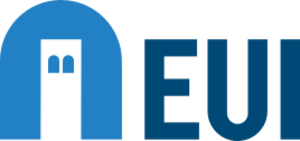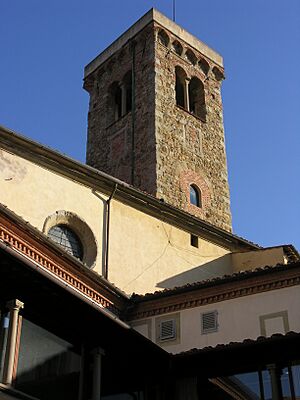European University Institute facts for kids
 |
|
| Type | Intergovernmental organisation |
|---|---|
| Established | 1972 |
| Budget | €93,700,000 |
| President | Patrizia Nanz |
| Annually 130 postgraduate researchers for four years | |
| Address |
Via dei Roccettini, 9 - 50014
,
,
Tuscany, Italy
|
| Campus | San Domenico di Fiesole |
The European University Institute (EUI) is a special university for students who have already finished their first degree. It's a place where people from many different countries come together to do advanced research. The EUI helps Europe grow in culture and science, especially in subjects like history, economics, law, and politics. Its main campus is in the beautiful hills above Florence in Fiesole, Italy.
The EUI gets its money from 23 countries that are part of its agreement, from the European Union, and from its own projects. This includes money from research, working with other groups, and special training courses.
Every year, about 130 new students join the EUI to work on their PhDs, which are advanced research degrees. They study in departments like Economics, History, Law, and Political and Social Sciences. The EUI also has master's programs and short courses for professionals. Around 1000 students and researchers from over 100 countries study here.
Since 1993, the EUI has been home to the Robert Schuman Centre for Advanced Studies (RSC). This center looks at important issues facing Europe. It helps connect academic research with real-world policy decisions. In 2017, the EUI also started the Florence School of Transnational Governance (STG). This school offers programs for graduate students, fellowships, and training courses.
The European University Institute is also part of a group called The European University of Social Sciences, or CIVICA.
Contents
History of the EUI
How the EUI Started
The European University Institute (EUI) was created in 1972 by the countries that were part of the European Community. The idea for a European institute first came up in 1948 at a meeting in The Hague. It was also discussed at a conference in Lausanne the next year.
In 1955, during a meeting in Messina, a German official named Walter Hallstein suggested creating a training center for nuclear science. This idea didn't go anywhere for a while.
A New Focus for Europe
The idea came back in 1969 when European leaders met in The Hague. They decided to fund a European University Institute in Florence. By this time, the idea had changed. Instead of nuclear science, the institute would focus on human sciences. It would help promote cultural exchange between European countries.
Plans moved forward with meetings in Florence and Rome in 1970 and 1971. It was decided that the institute would be for students doing advanced studies after their first degree. It would not be a direct part of the European Community.
Opening Its Doors
The first six member countries – Belgium, France, Germany, Italy, Luxembourg, and the Netherlands – signed an agreement in 1972. This agreement officially created the EUI as a place for research and development. The agreement became official in 1975, and the EUI welcomed its first 70 researchers in 1976. Its main goal, set in the 1970s, is to "help learning grow in areas that are especially important for Europe's development."
Denmark, Ireland, and the United Kingdom joined the European Community in 1973. They later joined the agreement that created the EUI. In 1992, a new agreement was signed by the 12 Community member countries at that time. This updated the original 1972 agreement. It became official in 2007.
Today, countries that join the EUI must be members of the European Union. As of December 2023, almost all EU member states are part of the EUI. The only exceptions are Croatia, Czech Republic, Hungary, and Lithuania.
What Students Study at EUI
Main Departments
The EUI has four main research departments. These departments focus on subjects in the humanities and social sciences.
- Department of History
- Department of Economics
- Department of Political and Social Sciences
- Department of Law
Florence School of Transnational Governance (STG)
The Florence School of Transnational Governance (STG) started in 2017. It is located in Palazzo Buontalenti in Florence. The STG is a place for people to share ideas and work together. It brings together academics, people from civil society, policymakers, businesses, NGOs, and the media.
Robert Schuman Centre for Advanced Studies (RSCAS)
The EUI also has a special center for public policy research. It is called the Robert Schuman Center for Advanced Studies (RSCAS). It is named after Robert Schuman, an important figure in European history.
Historical Archives of the EU
The Historical Archives of the European Union (HAEU) was created in 1983. This happened after the European Coal and Steel Community (ECSC) and the Council of the European Communities decided to open their old records to the public.
In 1984, an agreement placed the Archives in Florence, at the EUI. The HAEU opened to the public in 1986. It is the official place where all historical records from the European Union's institutions are kept. It also holds over 160 private collections from important European people, politicians, and groups who helped with European integration. Since 2012, it has been in its current home, Villa Salviati.
You can look at the Archives' online database to find descriptions of documents, videos, and other items. You can also look at the actual materials in the HAEU reading room. The HAEU helps people do research on European integration by offering several grant programs.
Doctoral Programs at EUI
The EUI offers special doctoral programs. These are advanced research degrees in economics, history and civilization, law, and political and social sciences.
Languages at EUI
The EUI has a Centre for Academic Literacies and Languages (CALL). This center helps students improve their language skills for academic work, both speaking and writing. It also helps them feel comfortable in the academic environment.
Major Events
The State of the Union Conference
The State of the Union is a big annual meeting organized by the EUI since 2011. It's a place for important people to talk about the European Union. This conference connects academics with top policymakers in Europe. It brings together leaders, EU representatives, professors, business leaders, and others. They discuss the main challenges and opportunities facing Europe each year. Many important figures, like presidents and prime ministers, have attended this event.
EUI Rankings
The EUI is one of the top research institutions for social science in Europe. With about 1,000 researchers at different stages of their careers, it is also one of the largest graduate schools. It works with about 90 international partners on research and educational projects.
In 2024, the EUI was ranked 6th in the world for political science by the Shanghai Ranking. It was also in the top 100 for sociology, public administration, and economics. In the QS World University Rankings, it was ranked 31st in the world for Politics and International Studies, 51st for History, and 89th for Law.
The EUI's Political and Social Science department was ranked 1st in Europe and 5th worldwide in the Hix ranking (published in 2004, covering 1998–2002). In November 2009, this same department was included in the Die Zeit 'CHE Excellence Ranking' for political science.
EUI Campus
The European University Institute is located in Fiesole, on a hillside in Tuscany. It overlooks the city of Florence. The main building is the Badia Fiesolana.
The campus is spread across 12 villas in the area. Many of these buildings are very old, dating back to the Renaissance period. They have been restored, along with their beautiful gardens. The EUI campus also includes Palazzo Buontalenti in the center of Florence. This building has been home to the STG since 2021.
Leadership at EUI
The main groups that run the EUI are the High Council (made up of representatives from member countries) and the Academic Council. The President of the Institute is Professor Patrizia Nanz. She is helped by the Institute's Secretary General, Marco Del Panta, and the Chief Operating Officer, Roberto Nocentini.
Former Presidents of EUI
- Max Kohnstamm, Netherlands
- Werner Maihofer, Germany
- Émile Noël, France
- Patrick Masterson, Ireland
- Yves Mény, France
- Josep Borrell Fontelles, Spain
- Marise Cremona, United Kingdom
- Joseph Weiler, United States
- Renaud Dehousse, Belgium
Notable Former Faculty
- Philip Alston, Law
- Giuliano Amato, Law
- Richard Bellamy, Max Weber Programme
- Jean Blondel, Political science
- Gisela Bock, History
- Kirti N. Chaudhuri, History
- Carlo Cipolla, History
- Colin Crouch, Sociology
- Maurice Cranston, Political philosophy
- Donatella della Porta, Sociology
- Gøsta Esping-Andersen, Sociology
- Sergio Fabbrini, Political science
- Peter Flora, Sociology
- Klaus Hopt, Law
- Søren Johansen, Economics
- Steven Lukes, Political philosophy
- Peter Mair, Political science
- Giandomenico Majone, Political science
- Alan S. Milward, History
- Michael Keating, Political science
- Thomas Risse, International Relations
- Giovanni Sartori, Political science
- Philippe C. Schmitter, Political science
- Andrew Shonfield, Economics
- Susan Strange, Political economy
- Gunther Teubner, Law
- Neil Walker, Law
- Joseph Weiler, Law
- Jay Winter, History
- Christian Reus-Smit, International Relations
Notable Alumni
- Manuel Perez-Garcia, Spanish Associate Professor at Shanghai Jiao Tong University (China)
- Catherine Barnard, British legal scholar
- Richard Bellamy, British Political Theorist at UCL
- Srđan Cvijić, Serbian political scientist
- Maurice Glasman, British political scientist
- Simon Hix, British political scientist at the London School of Economics
- Jonathan Hopkin, British political scientist
- John Loughlin, Professor at the University of Cambridge
- Peter Mair, Professor of Political Science at Leiden University and the EUI
- Frank Schimmelfennig, Swiss political scientist
- Nuno Severiano Teixeira, Portuguese scholar, Minister of Defense
- Joachim Wuermeling, German politician
- Martin Westlake, British, Secretary-General of the European Economic and Social Committee
- Mishal Husain, British, BBC World
- Marta Cartabia, Italian, Former President of the Italian Constitutional Court
- Marco Doria, Italian, Mayor of the city of Genoa
- Brigitte Granville, French, Professor at Queen Mary University of London
- Tiago C. Peixoto, Brazilian political scientist at the World Bank.
- Dame Cindy Kiro, Governor-General of New Zealand
 | Janet Taylor Pickett |
 | Synthia Saint James |
 | Howardena Pindell |
 | Faith Ringgold |



